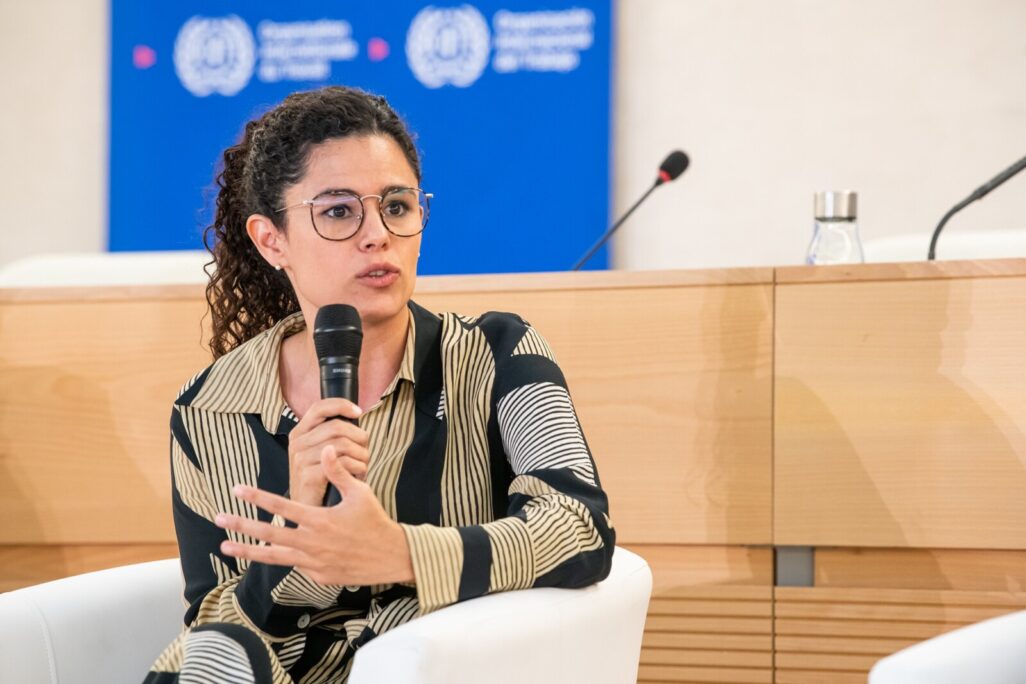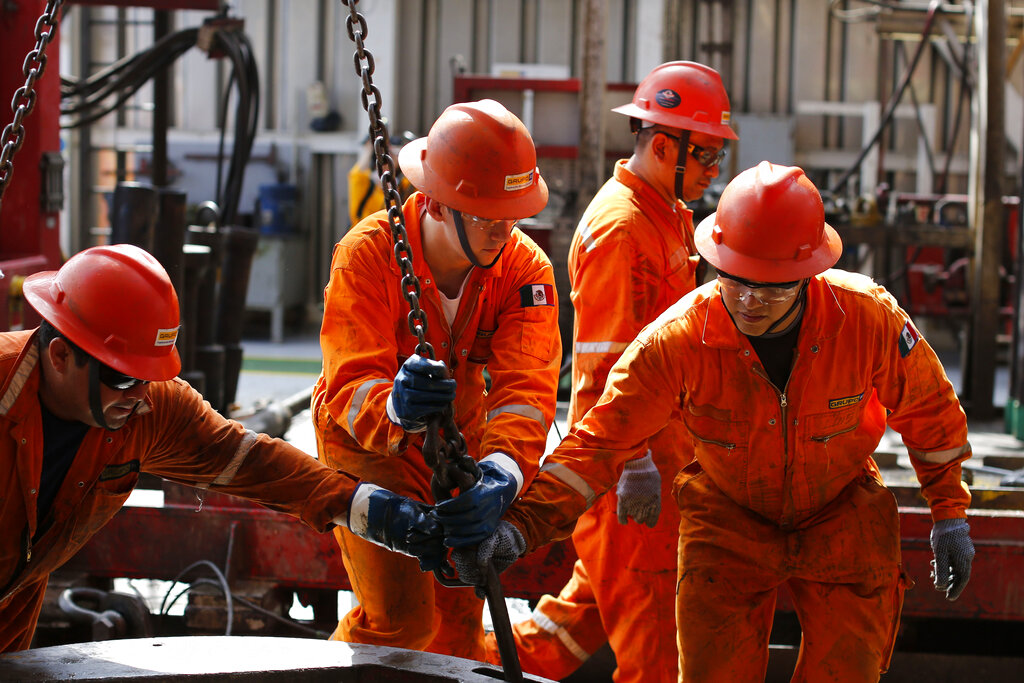
"Mexico has suffered for over forty years from conservative policies which have reduced the workers' safety net," Luisa María Alcalde Luján told Davar. Earlier this week, Alcalde was named Mexico's Secretary of the Interior after serving for five years as Secretary of Labor and Social Welfare. In her time in office, she led a trend of change in Mexican society: strengthening workers' and trade union rights, encouraging government investments in education and welfare and promoting youth employment.
Alcalde is a member of the National Regeneration Movement party. More commonly known by its Spanish acronym MORENA, the left-wing, anti-neoliberal party has been in power in Mexico under President Andrés Manuel López Obrador since the 2018 elections. The highly popular party supports ethnic, religious, cultural and sexual diversity, respect for human rights and concern for the environment. While participating in the International Labour Organization (ILO) conference in Geneva, Alcalde sat down for an interview with Davar and discussed the path to change and her opposition to the neoliberal economic policies that Mexico has adopted since the 1980s.
"The neoliberal model has failed in Mexico. There's a reason it's become synonymous with corruption. Mexico has struggled to attract foreign investment, and we have become a country which pays one of the lowest wage rates in the world, with huge gaps and inequality, increasing poverty, and an unprecedented expansion of the informal economy."
"The First Step was to Restore the Minimum Wage"
The labor paradigm promoted by Mexico's current government focuses on protecting workers' rights and creating growth based on investment in infrastructure, inclusion of more populations in the labor market, and the adaptation of education and vocational training to the evolving labor market.
How is this paradigm expressed in practice?
"Our first step was to restore the minimum wage through dialogue with employers and trade unions, and creating a consensus based around goodwill. In four and a half years, we managed to recover 90% of Mexico's purchasing power. In a sense, this decision alone means that 19% of our population will be lifted out of poverty through work, we have reduced the wage gap between men and women by 25%, and we have ensured a certain minimum level of well-being. More people can make a living from their jobs."

Another goal Alcalde has flagged is to eliminate abusive employment practices that have become prevalent in Mexico. For example, the minister promoted legislation that reduced subcontracting and outsourcing, which were prevalent in labor relations in the country.
"We're aiming to re-increase the value of labor. We have made progress in preserving the right of workers to take part in the company's profits. Wage policy is one of the most effective ways to better distribute wealth."
You talk about the world of work in the context of social justice. What is the role of education and vocational training in creating social justice?
"I am engrossed with the question of how we can improve the education systems to suit our age and the changing reality in which we live. It's important to me that the investments we make in education be relevant. Part of it is to look at what happens in the transition from school to work."
What has been done regarding this aspect so far?
"We established a network of universities in areas that never had universities. Previously, there was no access to higher education, and the talents of many young people were wasted. They had no access to the labor market. For example, the new universities also focus on local issues, such as sustainability. Take the Lacandon jungle, for example. The degrees offered in local universities there will focus on agriculture and forest farming. For the people in the state of Chihuahua who live in the north of the country where mining is important, we've seen a push for mining-related sciences, and for degrees in environmental recovery.
"This means that we must try to achieve a more efficient and better fit not only with the educational reality, but also with our own reality. We are talking about future projects for the next three, five and even ten years. It is clear to us that we will need all these youth, all these young children. We have to give them the right education so they have access to the labor market."
"In 2018, there were 17.5 million Unemployed Young People"
What does this policy mean for the participation of young people in the labor market?
"This is an area that previously had not been addressed at all. In 2018, there were 17.5 million young people who did not work, not because they didn't want to, but because they didn't have the right training and skills. They didn't have opportunities. In the past, young people were really excluded from the labor market. To this end, we implemented the ‘Youth Building the Future’ program designed to provide young people with training relevant to the labor market.

"As part of the program, 2.75 million young people have worked as apprentices in small and medium-sized businesses and learned the trade from the field, from real life, for a year. Apprentices in the program receive a government scholarship equivalent to the minimum wage during the year, and acquire the skills and competencies needed in the industry. There is no precedent elsewhere in the world for a program on this social scale, which enables the integration of young people into the labor market."
What results have you seen?
"Over the course of two years, young men and women participated in the program and received relevant professional training. Sixty-nine percent of the participants were women. We targeted people aged 18-29 who had neither studied nor worked. The results showed a significant decline in unemployment. The numbers declined and remained low despite the coronavirus. These are the lowest numbers of youth unemployment we've seen in the last twenty years."
The Tren Maya will Connect Five States to the Center of the Republic
What are you doing to integrate more communities into the workforce?
"We realized that we needed to emphasize not only degrees and certificates, but to develop new capabilities and technological orientation among young people. We examined the needs in each region of the country to tailor the response. For example, in the north, an appropriate answer to their needs is to teach programming, technology, and IT, but we also have the south of the country, where the reality is completely different. The south suffers from a lack of infrastructure and there is no industry.
"As a government, we understood that we had to establish different development centers that would allow us to create real growth. An example of this is a project that we are pushing with all our might, which we called the Tren Maya (an intercity railway, scheduled to be completed by December 2023). This is a train that will allow us to connect with five different states of the republic in the Mayan region to develop tourism. At the same time, we are setting up training for women and men in these areas.
"In addition, a trade route is being built that will connect the Pacific and Atlantic coasts, which will help create and develop the industry."
What, in your opinion, is the key to the success of your program?
"One of our most significant reforms was ensuring freedom and democracy in trade unions. Workers elect their managers through personal, free, direct and secret voting. It allows them to actively participate and to conduct collective bargaining negotiations."
What is your position on the claim that powerful unions scare away external investment?
"I know those claims. I am proud to prove that policies which support workers' rights and respect for labor are far from creating instability and intimidating investors. The reality is the opposite and we are seeing its results: despite the pandemic, our employment situation is the best the country has seen in decades. We are seeing an increase in employment rates in the formal economy, higher wage levels than ever before, and at the same time a steady increase in foreign investment."
In recent years, you have strived to join international conventions and treaties in the field of labor relations.
"We promoted the freedom of association of unions, alongside the independence of these unions to conduct collective bargaining negotiations, based on international conventions of the ILO, which we recently ratified. We have also signed treaties relating to domestic workers and against violence and harassment in the work world. We did this within the framework of international cooperation and solidarity, and the ILO helped us create targets for the basic levels of rights we were aiming for.
"During the current conference, I signed the document ratifying ILO Convention 29 on Forced Labour. We are also making progress in ratifying the Convention on Occupational Safety and Health and on Safety and Health in Mines. It is important for me to ratify the conventions signed through the codes of dialogue and through striving for consensus. There is no doubt that international cooperation has a lot of potential in these areas.
"I believe this will help eradicate forced labor. Proof of this is the implementation of the mechanism to restrict the import of goods produced by forced labor. This puts Mexico at the forefront of implementing and respecting fundamental rights at work."
This article was translated from Hebrew by Benji Sharp.






